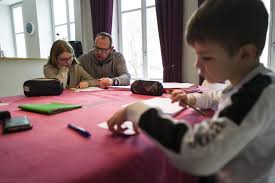Italy: Tips to keep kids entertained

Rome: With Italy under quarantine and schools closed, many families face a long confinement together. Clinical psychologist and home education specialist Naomi Fisher offers some tips for keeping children entertained and learning.
No one expected this, and no one is prepared. Across Europe children are off school, perhaps for months, and their parents are struggling to cope.
For those who live far away from extended families the situation can feel even more frightening.
Lucy is typical. She got in touch to ask me for ideas. Her son is off school, she and her husband are both at home and it’s hard to adjust.
Her husband wants him to do worksheets, but her son, as she put it, is ‘saying no to just about everything. It’s a common scenario. Kids who are compliant at school are very different at home.
However, that doesn’t mean you have to be in for months of conflict. What works at school doesn’t work at home, but learning can continue all the same. What it takes is a mindset shift on the part of parents.
The key to it all is to start with your individual child and what they like to do, rather than with the idea that they need to do certain things. This way, they will be motivated and learning will flow.
Start with what interests them: School presents a curriculum to children which they have little choice about. At home, they have more choice and they frequently refuse.
Instead, start with what fascinates them. Follow their questions and do some research. Top topics in our house this week have been how viral DNA works, travel restrictions in WW2, how glue works, the French revolution and how to decorate wooden boxes. No question is too trivial.
Focus on connection: Make your aim connecting with your child, rather than getting them to do things.
This is a strange and unusual time for everyone. Make time to do special things together. Have a family movie night, turn the lights off, cuddle up under the duvet and watch it all together. Bake a cake and have a tea party. Lay the table and dress up, make it an occasion.
Join your child in their activities rather than trying to persuade them to do something else
If they resist all your suggestions, stop making them. Instead, join them in doing what interests them.
If that’s Lego, then you do Lego too. If it’s painting, have a go. If it’s video games, ask them if you can play too. Learn how to play Minecraft or Fortnite. You might be surprised at how much you enjoy it.
Games, games, games: Games are fun for everyone. If you have board games, go and explore your cupboard and pull out the games you haven’t tried for ages.
If you don’t, there are multiplayer tablet versions of many favourite games, including Cluedo, Monopoly, Exploding Kittens, Carcasonne, Ticket to Ride, Settlers of Catan and The Game of Life.
Some of them, like Cluedo, you can play with far away friends if they also buy the app. These games are well worth the investment of a few euros and the tablet versions are generally much cheaper than the physical game.
Explore the full potential of your screens : This is not the time to impose rigid screen time bans. It is the time to exploit all the potential of any devices you may have.
Odds are that there are things your smartphones and tablets do which you have never tried. Young kids will enjoy playing with the Calculator app, and it helps them understand numbers and maths.
Take photos and edit them, try out filters and special effects. Take videos and make a movie using free video-editing software. Try making a stop motion film, again using free apps. There are many tutorials on YouTube. Make a podcast by recording yourself.
Virtual play dates: We’re all in this together. Contact your child’s friends and ask them if they’d like to hang out over Zoom, WhatsApp or Skype.
Younger children often find it hard to know what to say, so suggest an activity. My kids draw, play games or sometimes just go about their lives with a friend to chat to. It doesn’t have to be long to make a difference to your day.
Read and Listen: Again, start here with what interests them, not with what you think they should be learning.
Find new books on the Kindle app if you’ve read your whole bookcase. Think about the books you loved as a child and try them out on your kids. Audible has a library full of audio books for those who prefer to listen. If anyone hasn’t yet discovered Stephen Fry reading Harry Potter, now is the time. Hours and hours of listening joy.
The way to buy these books (which are unabridged and expensive) is to buy credits or to sign up for an Audible subscription which means you get a credit a month.
Keep Moving: Even if you can’t get out, keep active. Try Cosmic Kids Yoga on YouTube. Use exercise programmes on your games console if you have one. Download a circuit training app for your phone. Construct obstacle courses in your front room. Put on some music and dance to it. The neighbours will understand.
Make time for activity every day. If they won’t get up off the sofa, you do the dancing and yoga instead.
Sing like no one is listening: Singing makes us feel good. Sing songs with your children, even if you think you can’t sing.
The Quarantine Choir on YouTube has short videos to teach you to sing a song. TheSofaSingers.net meets weekly for people all over the world to sing together over the internet.
are a good place to start if you want to learn some new songs. You can find many of the songs on Youtube or you can subscribe to Spotify. Songs from The Lion King (in French and English), Emilie Jolie (French), Le Soldat Rose (French), Mary Poppins, Annie and Aladdin are good for younger kids.
For older kids and adolescents, try Hamilton, West Side Story, Les Miserables (in French and English) and Miss Saigon. The stories may lead to questions about the history, so be prepared to explore. The difference between the French and English translations of The Lion King led to many conversations about language in our house.
Look after yourself: This could be a long haul. What do you need to keep yourself healthy and sane? The BBC has some helpful ideas for looking after your mental health. Don’t check the news constantly, make sure you cook food you like, and instigate some time when you are not available to your children. Find an audio book for you, or dive into a novel which takes you far away from March 2020.
In our house when we were home educating we had ‘non-interruption time’ after lunch each day when everyone did something quietly in their rooms and interruptions were only for emergencies.
For some children, you’ll need to define emergency quite carefully. I’ve been interrupted for a misplaced yellow pencil before. If your children are young, this will take a while for them to learn and you might need to build up slowly, a couple of minutes at a time. If they are very young, of course this time is called Nap Time.





